 Remember that monthly call I have with my friend Joy Petty? We had another invigorating conversation I want to share. I’m no expert on this topic, but I have had experience with it. Joy is an expert.
Remember that monthly call I have with my friend Joy Petty? We had another invigorating conversation I want to share. I’m no expert on this topic, but I have had experience with it. Joy is an expert.
Learning by doing is a powerful way to teach children. When they experience something new or exciting, it’s an effective way to absorb information and to learn. This can be helpful for those who learn best by doing rather than reading or hearing. We all have kids who learn in different ways. I love reading, but I’m also a hands-on learner who needs repetition.
What Kid Loves Shakespeare?
I’ll be honest, I never got Shakespeare. I took a class in my senior year, and we read Shakespeare and talked about it. I was as in the dark as before I took the class. A few years later, I saw the movie Romeo and Juliet, and my dislike for Shakespeare faded somewhat. I could understand more of what was happening. Reading Shakespeare wasn’t all that helpful to me, even though I am a reader at heart. (Joy would say that’s because Shakespeare is meant to be seen and heard!)
For the last 10 years, Joy has been mentoring youth through project-based learning experiences (with what she learned from LEMI, Leadership Education Mentoring Institute). These projects incorporate multiple kinds of hands-on learning. The first project was called Shakespeare Conquest, where her students became familiar with Shakespeare through many immersive experiences, including reading, watching, and listening to dozens of plays, giving presentations on Shakespearean life, and participating in a Shakespeare play at the end of the year. Trying to read and memorize Shakespeare’s lines was challenging, and some of them didn’t think they could do it. But through all the weeks of practice, they learned to speak the Shakespearean language and enjoyed it so much that they’ve put on a Shakespeare play almost every year since.
Joy’s own experience was similar to the kids. Before her training and preparation to teach the Shakespeare Conquest class, she wasn’t very familiar with Shakespeare, and didn’t see the point in spending so much time on it. She didn’t have the time or energy to care about Shakespeare until she began the project. As she immersed herself in it, she was better able to help the youth learn their lines and understand what they were saying. Only when she experienced it herself could she begin to understand how much we learn about human nature, as well as how much cultural literacy we gain from Shakespeare.
This was Joy’s experience with the kids she worked with. They didn’t care about Shakespeare until they began to learn the lines and perform them on stage. Being immersed in the story made ALL the difference.
In her work with kids, Joy helps them participate in simulations. It is a safe way to learn.
For example, when they were learning about the Civil War, they had a battle with Nerf guns. But one side didn’t have as many bullets as the other, and their supplies (the nerf bullets they needed to keep fighting) ran out much more quickly. They got a first-hand idea of how men would feel as they fought in battles without the necessary supplies. They had a greater appreciation as they studied the stories because they had experienced not having all the supplies they needed to win.
At one point while learning about the Revolutionary War, the students each stood in a bucket of ice water. They were talking about the winter and how many soldiers had frostbitten feet and hands. Their appreciation for what these men, and some women, went through as they fought for America’s independence grew exponentially.
For the past several years, Joy has put on a Youth Experience Summit, a four-day summer youth event called YES Week. The point of the event is to give the youth a safe space to learn through simulations/immersive learning. The YES Week website talks about why:
Learning Is In the Doing
“Simulations can provide learners with hands-on experiences, allowing them to actively engage with and better retain what they learn. In simulations, learning happens through experience. By immersing students in realistic scenarios, they have the opportunity to explore, experiment, and make decisions in a safe environment.”
“Simulations help learning stick. Research in education has shown that 70% of information retention comes from direct experience, which is why simulations are so effective. Students actively participate in problem-solving, critical thinking, and decision-making, leading to a deeper, more meaningful learning experience.”
“Simulations offer a safe space for mistakes. The process of making and reflecting on mistakes is crucial for deep learning, and simulations provide an opportunity to do so without real-world consequences. This encourages students to take risks and explore different solutions without being afraid to fail.”
Immersive Learning Doesn’t Just Apply to Shakespeare and History
Often, our kids miss these experiential/immersive types of learning. One reason is that we live in perilous times, and parents want their kids to stay safe. But we can offer them ways to have real experiences with what life is going to be like in safe ways. We can plant a garden and have them help put food on the table, literally. We can take them on trips to meet people unlike themselves, eat different kinds of foods, and experience different cultures. We can attend other churches. I did this in my junior year with my parents’ blessing and learned why I held the beliefs I did. We can help them participate in a sport that is new to them. My parents helped me try skiing. I knew it wasn’t for me because I had tried it. LOL
You can watch all the cooking shows you want, but to really understand and love cooking, you eventually must cook. You can watch others ride bikes for years, and you may enjoy it, but to feel the exhilaration of riding, you have to ride. When we experience what we want to know about and understand, through simulations or immersive learning experiences, we gain a depth of knowledge we might otherwise miss.
Understanding Money Management Through Immersive Learning
Let me share one way my daughter has allowed her children to have an immersive learning experience. Three of her kids are now 13, 15, and 17. A few years ago, she opened a bank account for each of them and got them a debit card. They talked about how debit cards are used and the consequences of misusing them. Then she stood back. Yes, they did overdraw, and when they got their weekly money, they had to use it to pay the bill. That hurt.
Here is what has happened in the last 3 years or so. Jack, who is 17, took a job feeding a neighbor’s horses twice a week. He wanted money in his account and access to his debit card. An allowance wasn’t cutting it, and after a short time, he could see the necessity of getting a job. He still feeds the horses, but now has a second job at a pizza parlor also.
Mary, who is 15, is carefully considering starting a nail business. She loves doing people’s nails, has lots of friends, and wants more money in her account. She has been using her money to purchase what she needs to do this work, and she practices. She did nails at our family reunion two weeks ago. She is careful with how she uses her debit card (her money) because she has a goal in mind.
Ben, who is 13, is still pondering his options. But it all began with experimental learning – what does it take to have and use a bank account and debit card? Just this week, he came and asked me if I had any jobs he could do. He needed to earn $15 for something he wanted. I gave him a job, paid him, and he deposited the money in his account. Then he was able to use his card to buy the item.
Immersed in Learning the Value of Preparation
When Don and I had six of our seven children, we wanted them to have an immersive learning opportunity with the idea of preparing ahead. They wondered why we had so many items in our garage that we didn’t use. Money was tight, and wouldn’t it be better spent on a new shirt or a pair of shoes, or how about a gallon of milk? They wondered why we had a propane stove, why we spent money on food storage for the future, why we had a port-a-potty, why they had to help in the garden, why I canned in the fall, and they had to help, and on and on. Don and I wanted them to experience why we did what we did as a family.
We decided to spend a full day and night pretending we had no electricity or water. Imagine that with 6 children. The port-a-potty was well used day and night. LOL. We cooked on the camp stove. Ok, that was not as fun as when we went camping, and we did get a better stove later. However, I was glad I wasn’t cooking on an open fire! LOL. It was late fall when we chose to have this learning experience, so they were all glad we had a propane heater. The only drawback was that Don and I didn’t know how to use it. We all got cold before we finally figured it out.
The next year, there was far less complaining about snapping beans in the fall, weeding the garden, being asked to manage money wisely, etc. They had experienced the value of what we were doing as a family, preparing for the unexpected.
Sewing and Immersive Learning
Here is another cool example of immersive learning. My friend Livia’s son got involved in theater at his school. He worked on sets and learned to sew and patch things. One day, he found a hole in his backpack. Because he had learned to sew while helping in the theater group, he fixed it and kept using it. He was proud of that backpack. Now, he will fix things even if he could buy something new.
Learning by doing, being immersed in the learning, is a powerful way for us to help our children move into a more prepared adulthood. Don’t be afraid to let them experiment in safe ways.
President Thomas S. Monson, a man I admire, explained: “God left the world unfinished for men and women to work their skill upon. He left the electricity in the cloud, the oil in the earth. He left the rivers unbridged, the forests unfelled, and the cities unbuilt. God gives to us the challenge of raw materials, not the ease of finished things. He leaves the pictures unpainted and the music unsung and the problems unsolved, that might know the joys and glories of creation.”
I loved this quote. It illustrates why we teach kids to ‘do’ Shakespeare, to experience money management and the need for work, the value of preparation for what may come, and how to make do because you know how, etc.
This summer, I’ve been rewriting and posting old articles from the days when I spent time helping my grands with immersive learning. You know the ones; they are called Learning Play. They fit in this category of immersive learning perfectly because when you experience something, it stays with you, and the learning can be fun.
Be creative and find ways to immerse your children in learning and preparing for life and adulthood.
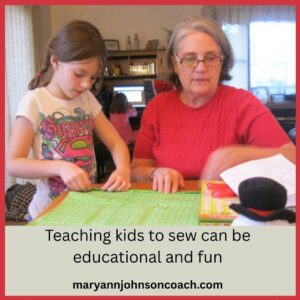 In 2012, the week after Christmas, Don and I traveled to Colorado to visit our grandkids. We loved and missed our daughter and her husband, but we went to see the grands! I’m always grateful for the time we took, in those early days, to spend time with them. Ashley, the grand in this story, is now in her mid-twenties and a wonderful hairdresser. They grow so fast, and you can’t reclaim their childhood. Hence, the perilous drive in the winter. : )
In 2012, the week after Christmas, Don and I traveled to Colorado to visit our grandkids. We loved and missed our daughter and her husband, but we went to see the grands! I’m always grateful for the time we took, in those early days, to spend time with them. Ashley, the grand in this story, is now in her mid-twenties and a wonderful hairdresser. They grow so fast, and you can’t reclaim their childhood. Hence, the perilous drive in the winter. : )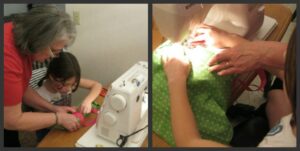 them their job is to push the material forward into the feed dog, and keep a straight line. Then I worry about the pedal. That way, they learn to do one thing before trying to do two.
them their job is to push the material forward into the feed dog, and keep a straight line. Then I worry about the pedal. That way, they learn to do one thing before trying to do two.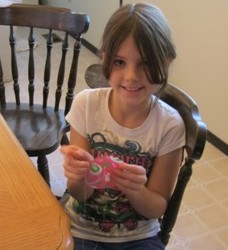

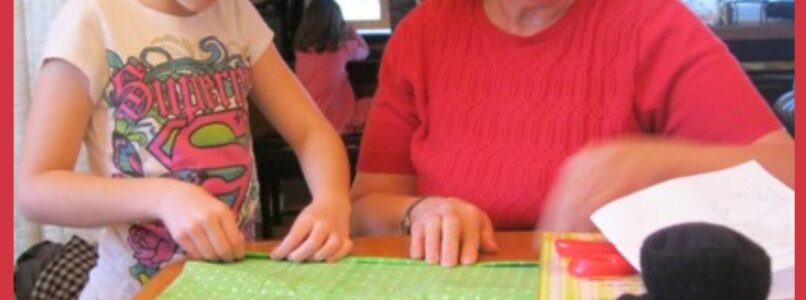

 A few days before my 54th anniversary, May 28th, I spoke to my good friend, Joy. I had been down with bronchitis for three weeks. I was challenged to keep up with caregiving and was feeling down, not at all like myself.
A few days before my 54th anniversary, May 28th, I spoke to my good friend, Joy. I had been down with bronchitis for three weeks. I was challenged to keep up with caregiving and was feeling down, not at all like myself.
 Later, I found Lizzy and Ashley sitting at the bottom of the stairs, looking at the books they brought home from the library. They had originally gone out to ride their scooters, but the books were so compelling that they never made it to the driveway. They were comparing the crystals in each other’s books, chatting away about the shapes, sizes, and colors.
Later, I found Lizzy and Ashley sitting at the bottom of the stairs, looking at the books they brought home from the library. They had originally gone out to ride their scooters, but the books were so compelling that they never made it to the driveway. They were comparing the crystals in each other’s books, chatting away about the shapes, sizes, and colors.
 Remember that monthly call I have with my friend Joy Petty? We had another invigorating conversation I want to share. I’m no expert on this topic, but I have had experience with it. Joy is an expert.
Remember that monthly call I have with my friend Joy Petty? We had another invigorating conversation I want to share. I’m no expert on this topic, but I have had experience with it. Joy is an expert.
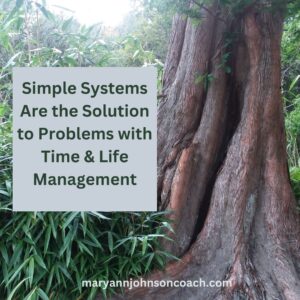

 I have had this recurring thought in the last five years – “Why are you writing? You aren’t raising kids anymore. You aren’t homeschooling. You’re getting older. Are you even relevant?” Then I get an email from a young mom thanking me for helping her see what she couldn’t see, or from an older mother or grandmother thanking me for reminding her of what she already knew.
I have had this recurring thought in the last five years – “Why are you writing? You aren’t raising kids anymore. You aren’t homeschooling. You’re getting older. Are you even relevant?” Then I get an email from a young mom thanking me for helping her see what she couldn’t see, or from an older mother or grandmother thanking me for reminding her of what she already knew.
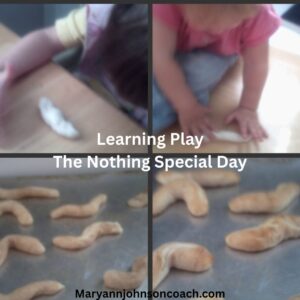 Back in the day, when my grands were small, I did many learning activities with them. I enjoyed it and so did they. As I mentioned earlier this spring, I’m sharing some of those past learning activities with you because you can have as much enjoyment and fun with your children or grands as I did. Sometimes all we need is an idea, and then we can run with it. So here goes!
Back in the day, when my grands were small, I did many learning activities with them. I enjoyed it and so did they. As I mentioned earlier this spring, I’m sharing some of those past learning activities with you because you can have as much enjoyment and fun with your children or grands as I did. Sometimes all we need is an idea, and then we can run with it. So here goes!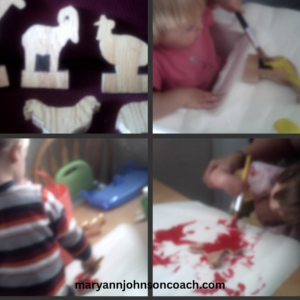 paper. When they were done and wanted another animal and a different color, we traded papers. Grandpa was very satisfied with the result. This particular range wouldn’t have his usual perfection, but it had memories and was fun to use.
paper. When they were done and wanted another animal and a different color, we traded papers. Grandpa was very satisfied with the result. This particular range wouldn’t have his usual perfection, but it had memories and was fun to use.
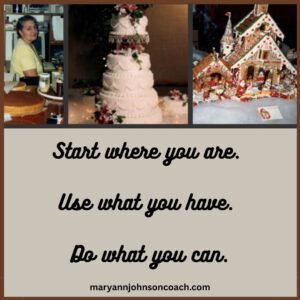 A few Sundays ago, my husband tuned in to a show my mom likes to watch,
A few Sundays ago, my husband tuned in to a show my mom likes to watch, 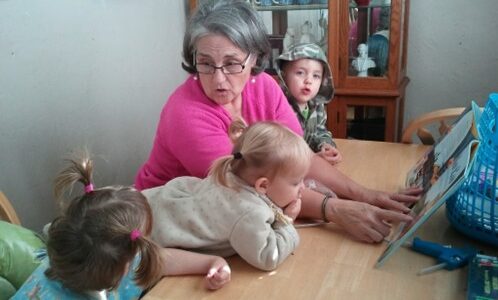
 One day in 2011, I found the most amazing book at the library!!! I happened across it accidentally. It was about Leonardo Da Vinci and the amazing visions he had. But that wasn’t all. The book showed how, in time, all his inventive ideas were created by other people and who those people were. Oh my gosh, I wanted to share this with my grands.
One day in 2011, I found the most amazing book at the library!!! I happened across it accidentally. It was about Leonardo Da Vinci and the amazing visions he had. But that wasn’t all. The book showed how, in time, all his inventive ideas were created by other people and who those people were. Oh my gosh, I wanted to share this with my grands. Our Super-duper Rocket-propelled Robot
Our Super-duper Rocket-propelled Robot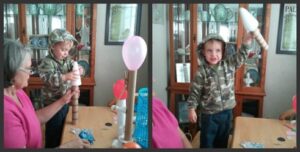

 I have the opportunity to talk with women of different ages about many things. It’s one of the perks of my life. This summer, I am sharing ‘A Series of Conversations’ – Articles that have come out of conversations with friends. I’m sure they will be what someone needs to hear, as they have been for me.
I have the opportunity to talk with women of different ages about many things. It’s one of the perks of my life. This summer, I am sharing ‘A Series of Conversations’ – Articles that have come out of conversations with friends. I’m sure they will be what someone needs to hear, as they have been for me. was a bright blue patch, surrounded by clouds, in the shape of a heart. I couldn’t pull over to take a photo, but I had seen it. It had been one of those busy, chaotic mornings, and seeing the heart helped me breathe and smile.
was a bright blue patch, surrounded by clouds, in the shape of a heart. I couldn’t pull over to take a photo, but I had seen it. It had been one of those busy, chaotic mornings, and seeing the heart helped me breathe and smile.